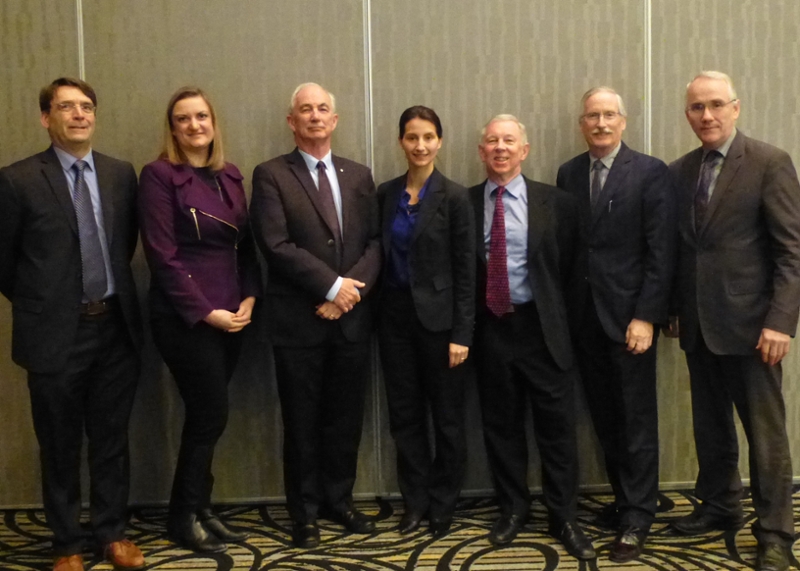UOIT Breakfast Briefing explores Paris climate agreements
Posted by Michelle Cholak on January 14, 2016
Leaders from 195 countries reached a landmark agreement in December at the United Nations’ 21st Conference of the Parties (COP21) that aims to limit global warming to 2°C or less. On January 7, 2016, the University of Ontario Institute of Technology (UOIT), together with the Durham Strategic Energy Alliance, hosted a Breakfast Briefing to discuss the key aspects of the agreement and the implications it will have within the greater Toronto area (GTA), Ontario and Canada. Members from the academic and business communities, along with representatives of municipal government and non-governmental organizations, participated in the event held at the Ajax Convention Centre.
Internationally recognized meteorologist and climate change expert, Gordon McBean, delivered the keynote presentation. McBean, who is President of the International Council for Science, the Co-Chair of the Governing Council for Future Earth, and Professor Emeritus at Western University, provided an overview of the rising levels of CO2 emissions in the atmosphere from fossil fuel use and industry, as well as the processes which could reduce our vulnerability and exposure to the risks associated with global warming, including socioeconomic pathways, adaptation and mitigation actions, and governance models.
He explained that the Paris agreement aims to keep global warming from rising “well below 2°C” compared to pre-industrial levels and a promise to “pursue efforts” to cap the warming at 1.5°C. The reality, he says, is that global temperatures will continue to rise until mid-century and the goal of the Paris agreement is to prevent further damage beyond that point. In fact, to limit global warming to 2°C, McBean says we will need to achieve zero net emissions between 2050 and 2100.
“We need to work together across disciplines to deal with the full range of issues associated with climate change,” said McBean. And while COP21 is an “important step”, he stressed it is not a binding agreement and that much of the agreement’s promise hinges on fine print to be hammered out in the coming years.
Following his keynote address, McBean participated in a facilitated discussion on the key aspects of the COP21 agreement and its implications for the GTA, Ontario and Canada. Brian Kelly, Manager of Sustainability, Region of Durham; Laura Zizzo, Founder and CEO, Zizzo Strategy Inc.; and Josipa Petrunic, Director and CEO, Canadian Urban Transit Research and Innovation Consortium (CUTRIC), joined McBean as panelists. Michael Owen, Vice-President, Research, Innovation & International, UOIT, moderated the discussion.
From left to right, Daniel Hoornweg, Associate Professor and Richard Marceau Chair, Faculty of Energy Systems and Nuclear Science, UOIT; Laura Zizzo, Founder and CEO, Zizzo Strategy Inc; Gordon McBean, President of the International Council for Science (ICSU), Co-Chair of the Governing Council for Future Earth: Research for Global Sustainability, and Professor Emeritus of Geography at Western University; Josipa Petrunic, Director and CEO, Canadian Urban Transit Research and Innovation Consortium; Brian Kelly, Manager of Sustainability, Region of Durham; Michael Owen, Vice-President, Research, Innovation & International, UOIT; and Bob Bailey, Interim Dean, Faculty of Energy Systems and Nuclear Science, UOIT.
"Through the Paris Agreement, the world has collectively agreed upon the need to decarbonize the economy in the second half of this century," said Laura Zizzo, a thought leader on the evolving legal and advisory landscape surrounding sustainability and climate who attended the COP21 negotiations in December.
"The race is on to the low-carbon future and the GTA, Ontario and Canada all have great potential to become leaders of the innovative revolution that is needed to address this global challenge," she said. "Government policy can support this move, but it will take industry and private-sector innovation and leadership to make the most significant gains."
As the Executive Director of CUTRIC, Josipa Petrunic is working to advance Canada's transportation system while reducing emissions, improving performance, speeding up routes, ensuring safety and connecting riders.
"COP21 made it clear that transportation and energy are no longer two separate economic spheres," said Dr. Petrunic. "The new transpo-energy matrix that defines a low-emissions future integrates renewable electricity generation with energy storage and electric propulsion; this includes hydrogen propulsion where the hydrogen electrolysis occurs in a low-emissions context. COP21 made it obvious there's no going back. Humanity must overcome the technological hurdles these technologies might pose today. Our lives depend upon it."
The UOIT Breakfast Briefing was generously sponsored by Veridian Corporation, Covanta Durham York Renewable Energy Limited and Metcalf Foundation.
Filed under: Sustainability 101
